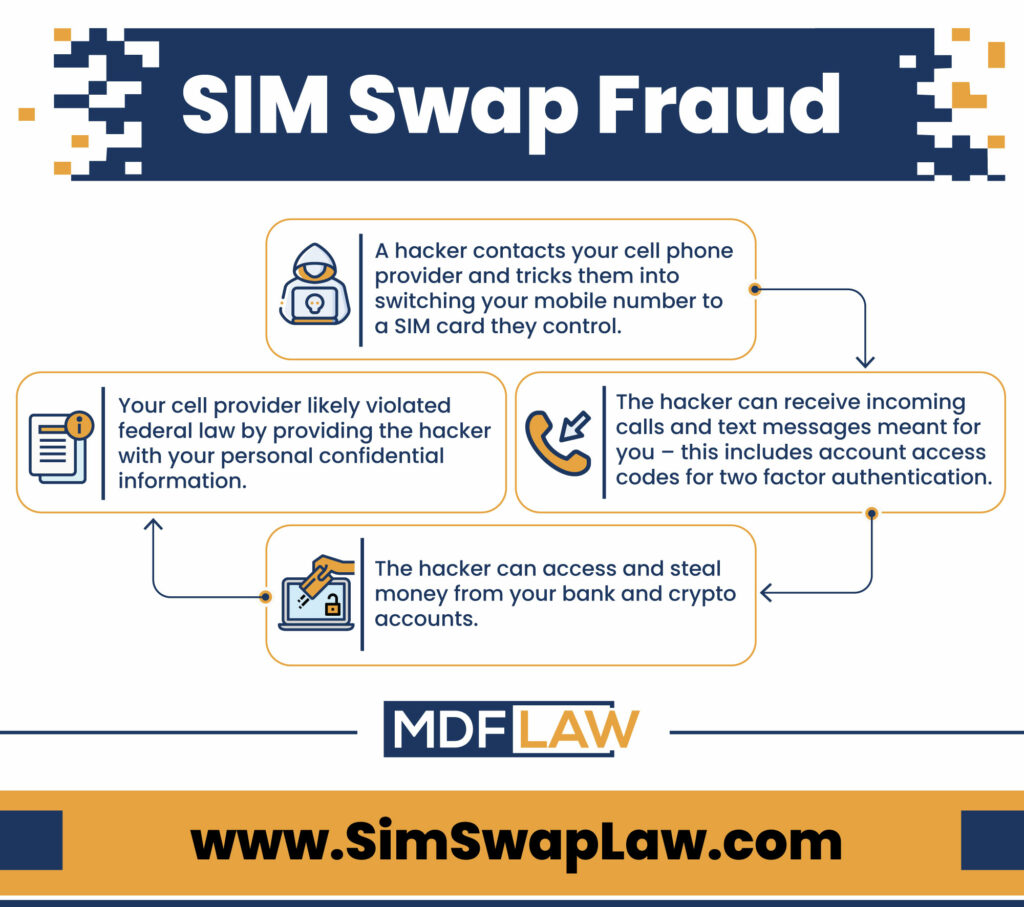Options for Hacked Coinbase Users

Coinbase may be liable to its users for crypto currency that was stolen as a result of a hack, including SIM swapping, phishing and other scams. All Coinbase users sign a user agreement, which establishes the rules and procedures for suing the company. The agreement mandates that all disputes be resolved through binding arbitration before the American Arbitration Association, or AAA. This means that users cannot sue Coinbase in Court. If you or someone you know wants to commence an arbitration against Coinbase, please contact our law firm by calling 800-767-8040.
What to Do After Your Coinbase Account is Hacked
Step 1: Notify Coinbase: You should immediately notify Coinbase as soon as you realize there were unauthorized transactions in your wallet. This is an important step to ensure that additional crypto currency is not stolen.
Step 2: Gathering Evidence: You should organize and gather any evidence that you may have. If your account was hacked, you should try to gather as much information as you can about the malicious actor. This includes, for example, their IP address and wallet address. If you were the victim of a sim swap, you should gather evidence of the attack from your mobile carrier.
Step 3: Hire an Attorney: Coinbase has a significant legal budget with tremendous resources. Before you formally engage them, you should seek independent legal advice from a crypto attorney. You could jeopardize your case by contacting them without an attorney.
Step 4: Pre-Dispute Resolution Process: Coinbase’s current terms of service require that a customer first file a complaint through their website before filing an arbitration. If you skip this step, your arbitration may be dismissed or significantly delayed.
Step 5: Commence Arbitration before AAA: After Coinbase responds to your formal complaint or 45 business days have passed, whichever occurs first, you can file an arbitration before AAA. The arbitration is governed by AAA’s consumer rules.
Was Your Crypto Stolen Due to a SIM Swap?

Coinbase Creates Procedural Roadblocks to Lawsuits
In addition to mandating arbitration, Coinbase’s user agreement also requires that users first submit all complaints to Coinbase before initiating an arbitration. As a condition precedent to commencing an arbitration, an investor must wait until either 45 business days elapses or Coinbase responds to the complaint. After that time elapses, the user can sue Coinbase by filing a complaint before the American Arbitration Association.
Once a user commences an arbitration against Coinbase, the rules for the arbitration are governed by AAA’s consumer arbitration rules as well as several customized rules provided in Coinbase’s terms of service. For example, Coinbase has special rules for “batch arbitrations,” which are claims involving more than 100 individuals represented by the same attorney.
Over the years, investors have made various attempts to persuade a court that Coinbase’s arbitration agreement is unenforceable. Generally, these challenges have been unsuccessful because our legal system upholds arbitration agreements absent a showing of fraud or unconscionability, two very high standards.
Attorney Fitapelli Explains How to Sue Coinbase
Frequently Asked Questions About Suing Coinbase for Hacks
How much does it cost for me to sue Coinbase?
MDF Law works on contingency, which means we are paid a percentage of the recovery we receive for our clients. We do not charge our clients hourly fees. If there is no recovery, our clients owe us $0.
Can you sue Coinbase if your account is hacked?
Yes. Coinbase may be legally liable to users for cryptocurrency stolen as a result of hacks, which include SIM swapping, phishing and other scams.
Do I have to sue Coinbase in arbitration?
Yes. Coinbase’s user agreement requires that all disputes be resolved through binding arbitration before the American Arbitration Association, or AAA. The procedural rules that apply are AAA’s consumer rules.
What do I have to do before I file an arbitration against Coinbase?
Before a user commences an arbitration, Coinbase’s terms of service require that a formal complaint be submitted to Coinbase online. Users can only file an arbitration complaint after Coinbase answers or 45 business days elapse, whichever occurs first.
Does Coinbase have insurance that covers hacks?
Maybe. Deposits with Coinbase are not insured by the FDIC, however Coinbase does have “crime insurance,” which its website states will protect cryptocurrency that is stolen from their platform as a result of a cyber security breach. Coinbase’s insurance does not cover losses resulting from unauthorized access due to a breach or loss of a user’s credentials. It also does not cover non-fungible tokens, or NFTs.
Is the cash that Coinbase holds FDIC insured?
Yes. Cash balances in U.S. Dollars, British pounds and Euros are held at US Banks. Coinbase currently uses the following US Banks: Signature Bank, JP Morgan Chace, Cross River Bank, Silvergate Bank and Pathward (previously MetaBank).
How does Coinbase make money?
Coinbase makes money by fees charged to individual consumers making transactions on their platform. Specifically, it charges a mark-up on the spot price of cryptocurrency when a user executes a trade.
Is Coinbase as secure as my bank?
Coinbase tells its users that it has “bank level” security, but flaws in its cyber security systems have resulted in the theft of many millions of dollars in customer funds.
What laws are Coinbase subject to?
Coinbase is subject to the Bank Secrecy Act, the USA Patriot Act and individual state money transmission laws. It is registered with the United States Department of the Treasury’s Financial Crimes Enforcement Network, or FinCEN, as a “money service business.” Finally, it is also a publicly traded company that is listed on Nasdaq. However, Coinbase is not a registered broker-dealer or exchange.
Who should I call if I have a dispute with Coinbase?
If you have a dispute with Coinbase, you should contact our law office by calling 800-767-8040. You should not contact Coinbase as your communications may be used as evidence against you.
